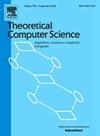异步 LOCAL 模式中的分布式计算
IF 0.9
4区 计算机科学
Q3 COMPUTER SCIENCE, THEORY & METHODS
引用次数: 0
摘要
LOCAL 模型是在分布式网络计算框架内研究局部性的主要模型之一。不过,该模型也受到一些相关批评,包括所有节点同时唤醒、以锁定步骤执行、无故障等事实。我们证明,在一定程度上放宽这些假设并不会损害本地计算。特别是,我们证明,对于与本地可检查标记(lcl)相关的任何任务 T,如果在 LOCAL 模型中,T 可通过确定性算法在 t 轮内求解,那么在 LOCAL 模型的异步变体中,只要 t=O(polylogn),T 仍可通过确定性算法在 O(t) 轮内求解。这改进了卡斯塔涅达等人[TCS, 2019]的结果,后者仅限于对环进行 3 着色。更广义地说,本文的主要贡献在于证明,只要通信保持同步和无故障,计算中的异步和故障并不会限制 LOCAL 模型的威力,这一点也许令人惊讶。为此,本文引入了一种新的分布式重命名技术,为节点提供一致的标识符。本文章由计算机程序翻译,如有差异,请以英文原文为准。
Distributed computing in the asynchronous LOCAL model
The LOCAL model is among the main models for studying locality in the framework of distributed network computing. This model is however subject to pertinent criticisms, including the facts that all nodes wake up simultaneously, perform in lock steps, and are failure-free. We show that relaxing these hypotheses to some extent does not hurt local computing. In particular, we show that, for any task T associated to a locally checkable labeling (lcl), if T is solvable in t rounds by a deterministic algorithm in the LOCAL model, then T remains solvable by a deterministic algorithm in rounds in an asynchronous variant of the LOCAL model whenever . This improves the result by Castañeda et al. [TCS, 2019], which was restricted to 3-coloring the rings. More generally, the main contribution of this paper is to show that, perhaps surprisingly, asynchrony and failures in the computations do not restrict the power of the LOCAL model, as long as the communications remain synchronous and failure-free. To this end, this paper introduces a new distributed renaming technique to provide nodes with consistent identifiers.
求助全文
通过发布文献求助,成功后即可免费获取论文全文。
去求助
来源期刊

Theoretical Computer Science
工程技术-计算机:理论方法
CiteScore
2.60
自引率
18.20%
发文量
471
审稿时长
12.6 months
期刊介绍:
Theoretical Computer Science is mathematical and abstract in spirit, but it derives its motivation from practical and everyday computation. Its aim is to understand the nature of computation and, as a consequence of this understanding, provide more efficient methodologies. All papers introducing or studying mathematical, logic and formal concepts and methods are welcome, provided that their motivation is clearly drawn from the field of computing.
 求助内容:
求助内容: 应助结果提醒方式:
应助结果提醒方式:


